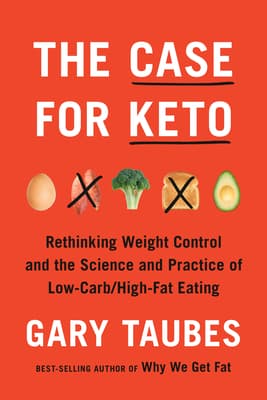
Book Review Summary: The Case for Keto: Rethinking Weight Control and the Science and Practice of Low-Carb/High-Fat Eating
Introduction
"The Case for Keto: Rethinking Weight Control and the Science and Practice of Low-Carb/High-Fat Eating" by Gary Taubes is a groundbreaking book that challenges conventional nutritional wisdom. Taubes, a renowned science writer, delves into the science behind low-carb/high-fat (LCHF) diets and argues that weight gain is driven by genetic, hormonal factors, rather than overeating or "gluttony" as commonly suggested. This book offers a comprehensive analysis of the bad science behind our nutritional dogma and provides hope to those seeking to prevent or reverse diabetes or obesity, as well as anyone looking to eat more healthily.
About Gary Taubes
Gary Taubes is an American science writer known for his in-depth research and investigative journalism. He is the author of several books, including "Nobel Dreams," "Bad Science," "Good Calories, Bad Calories," and "The Diet Delusion." Taubes studied applied physics at Harvard University and aerospace engineering at Stanford University before pursuing a career in journalism. His books explore scientific controversies, including the correlation between obesity/weight gain and sugars/starches. Taubes's work has been influential in challenging conventional wisdom on diet, weight control, and disease.
Analysis of Views
-
Scientifically sound: Readers praise the book for its scientific rigor and thorough analysis of the bad science behind conventional weight loss advice. Taubes's journalistic approach provides compelling evidence to support his argument that weight gain is driven by genetic, hormonal factors, rather than overeating or "gluttony."
-
Practical advice: The book offers practical advice for those seeking to adopt an LCHF diet. Taubes emphasizes the importance of understanding individual metabolic differences and tailoring dietary habits accordingly. He provides guidance on how to implement an LCHF diet in a healthy and sustainable way.
-
Challenging the status quo: Readers appreciate Taubes's willingness to challenge the widely accepted notion that calorie reduction is the key to weight loss. He presents compelling evidence that carbohydrates trigger insulin release, leading to fat storage, and that an LCHF diet can help individuals lose weight without feeling hungry.
-
Real-life stories: The book features numerous real-life stories of individuals who have successfully adopted an LCHF diet to improve their health. These stories provide readers with inspiration and reassurance that the LCHF approach can be effective for weight loss and disease management.
-
Comprehensive coverage: Readers appreciate the comprehensive coverage of the science and practice of LCHF eating. Taubes delves into the history of nutritional advice, exploring why previous dietary recommendations have failed to produce desired results. He also discusses the long-term effects of LCHF diets, addressing concerns about cholesterol levels, environmental impact, and potential limitations.
Reasons for Recommendation
-
Scientifically sound: The book's scientific foundation makes it a reliable source of information for those seeking to understand the underlying mechanisms of weight control. Taubes's thorough research and analysis provide a solid basis for his recommendations.
-
Practical advice: The practical advice offered in the book is valuable for individuals looking to adopt an LCHF diet. Taubes's emphasis on individual metabolic differences and tailored approaches ensures that readers can implement the diet in a way that suits their unique needs and preferences.
-
Challenging the status quo: The book challenges conventional nutritional wisdom by presenting compelling evidence against the calorie reduction approach to weight loss. Taubes's arguments force readers to reconsider their beliefs about dieting and consider alternative approaches like LCHF eating.
-
Real-life stories: The inclusion of real-life stories adds credibility and relatability to the book. Readers can draw inspiration from individuals who have successfully adopted an LCHF diet and overcome health challenges, making the book more engaging and persuasive.
-
Comprehensive coverage: The comprehensive coverage of LCHF eating provides readers with a holistic understanding of the topic. Taubes's exploration of historical context, long-term effects, and potential limitations ensures that readers are well-informed before making any dietary changes.
Reasons for Not Recommendation
-
Limited focus on specific diets: Some readers may find that the book focuses more on the underlying science behind LCHF eating rather than providing detailed guidance on specific dietary plans or recipes. They may prefer books that offer more concrete recommendations for implementing an LCHF diet in their daily lives.
-
Potential controversy: The book's controversial claims may be a turn-off for readers who are more comfortable with conventional nutritional advice. Some may be skeptical of Taubes's arguments or feel that he overlooks other factors contributing to weight gain, such as sedentary lifestyles or psychological factors.
Conclusion
"The Case for Keto: Rethinking Weight Control and the Science and Practice of Low-Carb/High-Fat Eating" by Gary Taubes is a thought-provoking book that challenges conventional nutritional wisdom by presenting compelling evidence against calorie reduction as the key to weight loss. With its scientific rigor, practical advice, real-life stories, and comprehensive coverage, the book offers a groundbreaking perspective on weight control and provides hope for those seeking to prevent or reverse diabetes or obesity, as well as anyone looking to eat more healthily. While some readers may find it limited in its focus on specific diets or controversial in its claims, the book's overall impact is significant in rethinking our understanding of weight control and promoting alternative approaches like LCHF eating.